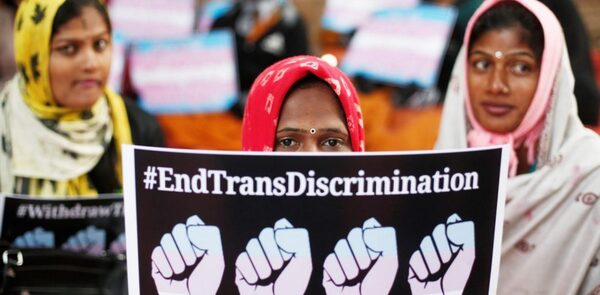Posted On April 25, 2023

It would acknowledge and help remedy the various types of discrimination that Dalit, Bahujan and Adivasi transpersons have to face
Written by Sudipta Das
On April 17, more than 15 trans rights activists from The Trans Rights Now Collective, who were peacefully protesting to demand horizontal reservation for transgender people, were detained by the Tamil Nadu police.
In Tamil Nadu and in many states across the country, the movement for horizontal reservation has been shaping up to support Dalit trans people who are struggling with transphobia and casteism in educational institutions, workplaces, and larger ecosystems of education and employability.
The reservation for marginalised caste identities is referred to as vertical reservation. Horizontal reservation is an intersectional approach that is provided for within each vertical reservation category. For example, a Dalit woman can access vertical reservation under the SC category, whereas through horizontal reservation she will be able to access reservations for women as well — both of which equally influence the person’s social location. Within the queer community, queer and trans people coming from certain socio-economic locations often have easier access to healthcare, educational and career opportunities, and forms of capital, which might not be the case for Dalit, Bahujan, and Adivasi (DBA) trans people.
This is why, in the last couple of years, several petitions have been filed in various high courts seeking horizontal reservation for trans people in government jobs and education. In 2021, Karnataka became the first and only state in India to reserve jobs in public employment for transgender persons. It has amended the Karnataka Civil Services (General Recruitment) Rules, 1977 to provide for one per cent horizontal reservation for transgender persons.
But the apathy around this matter across states doesn’t only harm Dalit trans people and their access to social mobility. It also renders the complex contexts that trans people come from invisible.
Founder of The Trans Rights Now Collective, Grace Banu, and members of the collective had demanded that the government of Tamil Nadu provide horizontal reservation for transgender persons in education and public employment. Kerala and Tamil Nadu currently have a vertical reservation system. As per the National Legal Services Authority (NALSA) judgment, transgender persons are supposed to have horizontal reservations. Grace filed an application to the same effect with the Supreme Court. On March 27, the SC refused to entertain the application.
The historic NALSA judgment of 2014 recognised transgender persons as equal citizens and issued directions to protect their rights, and acknowledged their entitlement to reservations. In 2014, Rajya Sabha MP Tiruchi Siva proposed a private bill that mentioned horizontal reservation for transgender persons and people with intersex variations. The bill was passed unanimously in Rajya Sabha that year. However, with the amendment made to the Transgender Persons (Protection of Rights) Act in December 2019, many important provisions, including that of horizontal reservation, were done away with. These policy gaps and ambiguities are often used by the courts to refuse horizontal reservation for trans people and instead offer vertical reservation.
The judiciary’s easy solution of putting all trans people in OBC categories is restrictive. Trans people who belong to SC/ST categories would not be able to claim their right to reservation under both SC/ST and OBC (Transgender person) categories, despite belonging to both communities. Those already belonging to the OBC category would not gain anything. Transgender persons would have to compete with others in the OBC category (This has led to very few trans people availing reservations in Tamil Nadu. As Grace recently noted, for the first time, 150 transpersons sat for a government job exam. Yet, they did not land any jobs because there is no horizontal reservation).
Furthermore, the homogenous understanding of the trans community underplays the caste realities and marginalisations that many trans people come from and how it further hinders their social mobility. Many DBA trans people have spoken about caste divisions in trans communities and the difficulties they add.
Reservation was introduced to recognise the historical injustice meted out to the people belonging to backward communities and identities and to implement provisions by which they would have better access to resources and opportunities.
Recently, in a historic students poll election at Hyderabad University, Hritik Lalan, a 22-year-old Dalit trans woman who contested from Ambedkar Students’ Association (ASA), HSU, won the post of GSCASH representative. While talking about the demand for horizontal reservation, she shared: “The state wants Trans identity to be a homogeneous category. Trying to save and integrate the ‘pathetically’ marginalised Trans people is the larger idea. They are looked at as victims living in peripheries and in disgust. This inseperableness of trans identity with that of a victim creates a discourse of a Trans person who has no other social identity and is thus put into vertical reservation categories. The intent of reservation which is social justice and the reasoning of reservation, that is historic underrepresentation, is itself defied. Transgender people don’t need welfarist schemes out of a savarna legislature’s benevolence. Horizontal Reservationational rights would assert that transgender people have an equal stake in this nation’s citizenship and public resources.”
This movement isn’t only about a Dalit-trans issue; it’s cross-cutting, and a living testimonial of how certain sections of people are repeatedly forced into the margins. This is not faded history, it’s happening right now. In literal translation, trans and Dalit mean beyond and broken— or perhaps beyond broken. Nothing can break the movement, nothing can break Dalit-trans people.
Das is a Dalit-queer feminist writer working with The YP Foundation. They write on media, caste, sexuality and queer rights
Courtesy : TIE

Leave a Reply